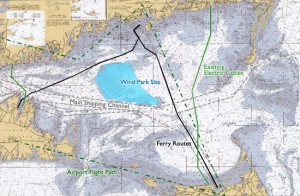
The Cape Wind project is a plan to construct a wind park about five miles off the coast of Cape Cod, Massachusetts. The park would be located in a region, Horseshoe Shoal, with strong, consistent winds, and far enough away from shipping and commercial boat traffic. The 130 turbines would be nearly silent from close distance, not audible at all from land, would not affect telecommunications and will include safety lights. It would produce an enough electricity to satisfy about 75 percent of the energy needs of Cape Cod, Martha’s Vineyard and Nantucket. Supporters of the project claim that the project will help produce cleaner air and lower greenhouse gas emissions, help make the country more energy independent, lower energy costs, and create thousands of jobs (both long- and short-term).
Most opponents, while supporting sustainable energy in theory, claim that Cape Wind would simply be located in the wrong location. Critics have stated the the project could diminish real estate costs, harm birds, destroy the fishing industry that relies on Nantucket Sound and ruin the aesthetic appeal of an otherwise untarnished horizon over the beaches of Cape Cod.
Opponents have also stated the leaders of the project are more concerned with ecotourism than with producing sustainable energy. Leaders of the project seem to be of the same mindset as Stephen Mather, the first Director of the National Park Service, who was concerned with bringing people to national parks, not merely with conservation. The project is still in the process of being approved, but it will take leadership that can unite the interests of all invested parties in order for it to succeed.
Here are computer simulations of how the wind farm would appear from the coast. Do you support or oppose Cape Wind? How can all interests be reconciled so that the project can begin?

I heard about this happening a while back and people being worried that a) it would look bad and b) it would make a lot of noise. Personally I think wind farms are pretty cool looking and the potential benefit of wind energy outweighs the cost of the noise in my mind. I will, however say that I think the concerns for habitats that are affected by the noise and construction are legitimate, but perhaps the reduction in pollution might offset that cost.
Generally, I do support the Cape Wind project. It has been proven in countries such as Denmark, that offshore wind is a viable option in promoting energy. While there are complications that exist and arguments regarding bird/bat deaths and the disruption of marine habitats, it does not even compare to that of oil drilling. I performed research regarding wind energy bias in Latin American media and reviewed some sources related to Cape Wind. In general, I had the sentiment that the majority of concern was related to the NIMBY principle and the fact that residents viewed turbines as an eyesore. However, the interesting thing was that they used such things as bird deaths as negative impacts when certain studies have shown that it would not be a large concern. In general, I support wind and believe that it is a technology that should be pursued. While I do understand some hesitation, I feel that the benefits do outweigh the costs.
I think we should definitely follow through with the Cape Wind Project. Of course there are some negative consequences, as with all energy. However, in order to minimize and spread these negative consequences, we should vary our sources of energy. We are heavily reliant on fossil fuels right now, which has taken its toll through global warming, oil spills, gas prices, contaminated water, mountaintop removal, and much more. We need to look into alternatives such as wind and solar. If we don’t now, we will be forced to later!
I wonder if more places will use this as an example. It seems to be a pop culture trend to include alternative energy sources. I know that the University next year is implementing solar panels on UFAs. I have heard that these forms of energy are not economically sustainable. I wonder if they might be a waste of money.